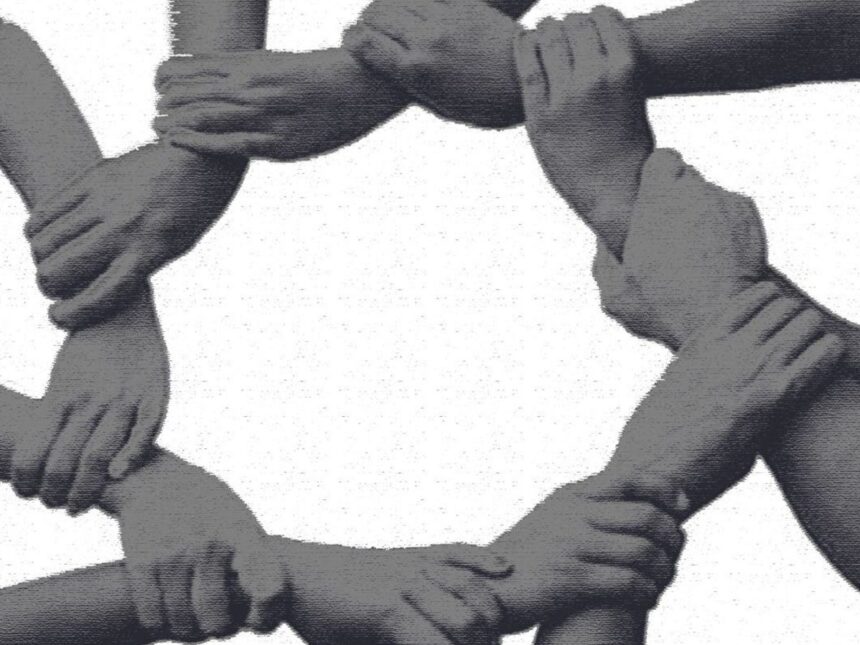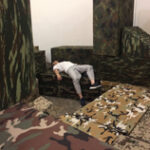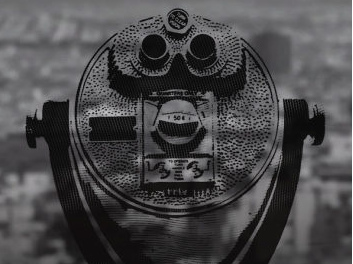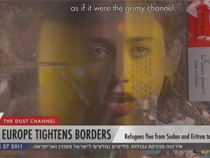Co-opting the Coop: Cooperativist Society documenta Public Programs, Parko Eletherias/Fairspot
Maria Juliana Byck
In this essay I reflect on the Cooperativist Society from the perspective of an individual artist responding to a high-profile cultural event in my newly chosen home of Athens. Although many aspects of what came to light through my participation in the project are not unique to Athens, they provide information, ideas and insights that can be useful to move forward if one would like to redefine art for a post-capitalist society. For me, it was an opportunity to become more cognizant of the barriers to success when bringing grassroots alternative economic ecologies inside the borders of an international art world event.
The Cooperativist Society is a place of action. It is an open initiative that establishes cooperative economic connections between documenta 14 as a global cultural industry event and local alternative or solidarity economy projects in Athens. The Cooperativist Society attempts to use documenta 14 as a lever, as a means to strengthen the local fabric of social pluralism. As part of this cooperativist vision we aim to empower and produce new and lasting circular economy relations, with and beyond documenta 14. This is only possible if you are involved in making it happen. [1]
So reads our public announcement of the Cooperativist Society opening as part of the documenta public program: the Parliament of Bodies. The project was initiated after documenta 14 curators invited international and Greek activists and artists working in alternative economic relations to participate. By promoting the local, circular economy through “the grandest and most important art exhibition in the whole world” [2] our hope was to inspire a broad range of artists, activists, cultural workers, entrepreneurs and documenta visitors to join or support cooperatives in Greece. The announcement goes on:
How can economic and social relations be collaborative, transferring ownership and agency back to the collective? We propose the formation of a Cooperativist Society closely tied to the global commons movement and the development of post-capitalist cooperative ecosystems. Some of the values we share with these movements are redistribution and economic exchange between equals, open political participation, decentralization of organizational forms, and the sharing and distribution of open knowledge. Based on these values, we aim to provide a platform as well as tools which facilitate fair economic relationships between documenta 14 workers, the audience, and local grassroots initiatives engaged in building an economy that goes beyond the “there is no alternative” mantra of neoliberalism.
After a friend, active in a local cooperative, forwarded me a letter of invitation, I joined the Cooperativist Society in January of 2017. As an artist interested in activating the commons as a means to disrupt the global flows of capitalism, the ideals and goals of the project were well aligned with my work. My main focus was to initiate an artist cooperative.Although I was also involved in creating media and outreach materials, liaising with documenta curatorial staff and organizing events. The Cooperativist Society brought together a wide variety of people over the 6 months or so it was active. The exact number of members is hard to estimate but there was a core group of approximately 7-10 at most times with an additional 25-35 people joining at various moments throughout the project. Some participated for several months, some for only a few weeks. There were many differences in ideas, perspectives and goals. Motivations for joining also varied widely. Some joined to promote their individual art, some out of interest in cooperatives, some to access documenta money and social capital, some curious onlookers, some committed to advancing Faircoin cryptocurrency and some because it was a good enough reason to spend some time in Athens. I am sure there were many other reasons. I considered the Cooperativist Society to be a social practice artwork, exploring alternatives to capitalism in the art world and in society at large. As an artist, my work focuses on transitioning traditional art practice to new modes of exchange and engagement with the goal of extracting art and life from the narrow confines of the capitalist system. Working in the vast terrain between a super-rich high profile, mega art event and daily life in Athens, the Cooperativist Society was on the contested borders of contemporary art. Some would say that it was not art at all and that perhaps it had no place in an art event. It was a place for exploration of creative practice not based on a product or value acquired through institutionalized status, nor was it easily consumable, commodifiable or describable. But rather, it was a constantly evolving and changing experiment in the dynamics of relationships, power structures and deeply entrenched ways of being. It was not an artwork that could be observed, one had to participate, make an investment of time, mind and body. It was something that capitalism’s cultural counterpart, the speculative, international art market, does not usually invite in or explore.
As planned in dialogue with the curators, components of the project were framed as what I would consider to be services for documenta. Here is just a quick synopsis of the plans. The Cooperativist Society was to provide information about the legal and logistical elements of starting a cooperative in Greece, organize discussions about alternative economies for the Parliament of Bodies, create and manage an outreach campaign and website, host a hackathon for the Open Collaborative Platform (OCP) being designed to support cooperative structures and alternative banking, launch an artist cooperative with local and international artists and initiate a fund to benefit artists after documenta, host open working group meetings as well as a general assembly every week, provide fair housing opportunities for documenta guests through a Fairbnb platform, set up info points at exhibition venues throughout Athens to encourage visitors to invest real money in Faircoin cryptocurrency, while at the same time working to establish relationships with local cooperatives and solidarity shops to accept Faircoin. In line with the values of cooperative structures, all the project components were to be managed and delivered through an open, non-hierarchical, consensus-based model with the ideal that everyone would have the opportunity to contribute, take initiative and responsibility for activities and decisions, and be fairly compensated. All this was to be accomplished within the timeframe of documenta being active in Athens. The group which formed was a fluctuating constellation of local and international, artists, entrepreneurs, programmers, cooperative advocates, activists and documenta audience members, most of whom had limited experience in a project of this nature.
This abbreviated overview of the Cooperativist Society’s goals just skims the surface, but it gives insight into the infrastructure and processes needed to support a more equitable, accessible and fair economic system; one that would be able to sustain daily life, as well as art and artists, through a cooperative model. This project was fundamentally at odds with the prevailing structures of capitalism and the art market. The global art world operates in an elite hierarchical system based on ownership, speculation and large budgets. It is an interconnected network that is designed to benefit those already in the upper echelons of power: wealthy institutions, art investors and instrumentalized art stars. In other words, those who are in the position to deem what is of value and importance in art and culture. Most artists and cultural workers uphold this system through their precarious labor, usually working for free or at very low wages. Seeking to challenge this and find a sustainable balance of power through equal access to resources and influence in cultural institutions as well as a viable alternative economic system is an enormous and bold undertaking.
Although part of documenta 14, the Cooperativist Society tried to mitigate the impact of co-option, by being wary of the problematic aspects of collaborating within a structure in which art and activism is funded by, and dependent on, large wealthy institutions. In general assemblies we discussed how to take a critical stance toward documenta, while benefiting the local cooperative movement by using the money and publicity it offered. In other words, using German money to create an alternative economy for Greece. It was an opportunity to experiment with ways in which the globalized financial assets of the art world can be hacked and redistributed, rather than used to reinforce prevailing power dynamics. The challenge was to constructively critique the institution from within, without sacrificing the accumulated cultural capital in grassroots movements, in exchange for the financial capital and mainstream prestige of documenta.
Many Athenians refused to take part in documenta and in certain circles there was direct opposition to the unbalancecreated by the influence of wealthy outsiders in Greek cultural institutions. For some, participating in documenta was seen as aligning with the colonizing power of Germany. While playing a central role in destabilising the Greek economy, it seemed Germany was now further enabling gentrification and exploitation of Athens and its people, while ignoring and insulting local art and culture. As a result, early on, several Athenians, and key members of the Cooperativist Society, withdrew under pressure from this very vocal, local movement critical of documenta. Fearing that their personal credibility and long term relationships would be jeopardized they stepped down. This created divides both inside and outside the group, crippling our ability to collaborate with other local solidarity organizations who ideally would have formed a network of support.
Many of the project components, such as cryptocurrencies, cooperative structures, consensus processes, and the technology being used to manage our collective projects were unfamiliar to most participants. Those who joined before the public launch were perceived as having leadership roles even though many of us had only been participating for a few weeks or months, at most. Conveying information about decision-making, goals, media representation, interactions with the curatorial team, public actions and events, as well as training people on the technical infrastructure for communication, as well as explaining cryptocurrencies, alternative banking and how the compensation system worked proved to be untenable once more people started to join. The scope of the project was so large it was impossible to understand all its components. Questions always led to more questions and unknowns, leading to frustrations of new members and a sense that information was being withheld.
The aspects of the Cooperativist Society that led to what could be perceived as failure were reinforced by several factors. Working within the condensed scope of the documenta timeline, the Cooperativist Society, despite its sweeping goals, was a fairly last-minute addition to the program. Most of the other societies in the public program had formed months before with the first presentations starting in September 2016. The Cooperativist Society was not mentioned in early publicity about the public programs and had its first presentation in mid-February 2017. As a result, there was less time to develop and strategize than other projects with far less ambitious goals. I therefore believe the Cooperativist Society was, in part, a response to the early public critiques of documenta as exploitative of the economic struggles of Athens. documenta was accused of treating the city as a backdrop of crisis, exoticizing the destructive nature of capitalism while not offering any viable or lasting alternatives. This speaks to the important role of constructive criticism and local questioning of the motives and value of mega international events. For the curators the goal of initiating the Cooperativist Society was to demonstrate tangible evidence of caring for Athens and its people, after being accused of callous indifference by self- proclaiming that they were “Learning from Athens” as a concept. There was a lack of time to develop the trust and clear systems of communication and decision-making necessary to transition to new economic models based on equality and transparency. Institutions such as documenta are designed for lone-genius art stars, not non-hierarchical collectives where the voices of many must be considered before decisions can be made, therefore the priorities were highly incompatible.
One of the goals was to compensate members of the Cooperativist Society fairly for their work. An initiator of the Cooperativist Society and an anti-capitalist activist, devised a model of compensation based on a combination of hours worked and tasks completed. Members of the project were paid in a combination of euros (provided by documenta) and Faircoin (provided through a relationship with Faircoop). Fair compensation is extremely difficult with limited funds and labor-intensive projects. Although this was lost in the shuffle, this aspect of the project was the beginning of a real solution to financial equity in collectively run projects.
Over-promising resulted in too many components with not enough people, time, expertise or language skills to implement in the timeframe dictated by documenta.The powerful influence of being affiliated with documenta and the charged atmosphere of a high-profile art event on artists seeking validation through participation led to strained internal dynamics. Suffice it to say there was Drama with a capital D: conflicting personalities, jealousy, incompatible expectations, hostile exchanges, accusations of deceit and vying for attention and power.
documenta, despite its claim to work against this idea, presents art as a cultural shopping mall for audiences to consume quickly and easily, without having to interact with real life. The sheer size of the exhibition and number of events made it impossible for people to spend more than a fleeting moment with any aspect of the offerings of the documenta program. To experience the Cooperativist Society, on the other hand, required days, weeks and months of engagement. Our goal was to build something real and lasting, unlike those of most other documenta artists who packed up and moved on to the next art event after a few months.
Artists questioning the power relationships within capitalism that documenta and the globalized art world depend on and reinforce, have the choice to either participate or to refuse. Both avenues have value and are necessary to explore. If pursuing the avenue of participating, one must accept the failure that comes with allowing oneself to be co-opted, but provides the opportunity to understand internal dynamics, in order to redesign to fail again and more convincingly. This way we can continue to scratch away at the foundations of the art market and capitalism from inside. At other times, we can refuse the money or prestige offered in the comfortable environment of the current funding models, bolstered by speculation and cultural hierarchies in the art world. Here we can create alternative structures for sustaining and redefining art, scratching away from the outside. Perhaps a more equitable artistic utopia based on a cooperitivist commons is where we will eventually meet in the middle.
Looking back, the goals were unbelievably ambitious, and proved to be extremely labor intensive and unrealistically broad in scope. The idealistic complexity of the project, coupled with different levels of experience and commitment, makes it no surprise that the relationships became strained. I left Athens for a few weeks, frankly happy to get away from some of the more frustrating personalities and dynamics the project had fostered. When I returned in mid-May things had changed drastically. The story I was told was that the curators had attempted to lower the budget midway through the project after expectations were not met and communication broke down. As a result the Cooperativist Society, and the experiment in post-capitalist cooperative ecosystems, severed relations with documenta 14 in May of 2017.
Although the reasons for the dissolution vary significantly depending on whom one speaks to, my hypothesis is that the main factor was the deeply ingrained difference between the values and structure of the commons-based social economic movement and the international art world. The cornerstones of capitalism: hierarchy, accumulation of power, ownership, and the exploitation of labor, are deeply embedded norms of the art world of which documenta is one of foremost leaders. documenta was created to establish Germany as a global cultural leader and arbiter of contemporary artistic practice through a mega art event with an enormous budget. In this context money is leveraged to overcome the trust, relationships and time needed to create truly viable alternatives to the current power dynamics. The amount of time and resourcesneeded to implement the goals of the Cooperativist Society could perhaps be accomplished if the entirety of the approximately 37 million euros (nearly $50 million) [3] budget for documenta 14, along with the 5 years of planning, went toward creating alternative economic structures for Greece. That would truly be groundbreaking contemporary art, focusing on the real world, real economics, real people and real lives. Then, perhaps, we would truly be able to Learn from documenta.
Through engagement with the project I learned about Athens, Athenians, and myself, thus realizing the curatorial theme of “Learning from Athens.” Perhaps the project did more to disrupt a fledgling and economically strained cooperative movement in Greece, than to nurture it. Nevertheless, it is part of an ongoing transformation of both individual and collective practices needed to reimagine the role of art and economics in society. The Cooperativist Society was not an artwork based on an audience or exhibition, but an opportunity to engage, to see oneself within the context of borders and barriers created by our current ways of being. It demonstrates how our practices of working together are hemmed in by hierarchical and top-down patriarchal structures which, despite our explicit attempts to overcome them, continue to replicate when we choose to work within that system. The art of the Cooperativist Society was in the relationships created, which have no tangible record, no physical manifestation. This badge of validation could only be seen by those who spent many days within the project. In this way the artwork extends beyond the documenta timeframe mainly through the individuals that had direct exposure to the obstacles and ongoing struggles within both the global and local cooperative movement. The knowledge and experience these people carry have the potential to manifest in many unpredictable ways over years to come.
From the confines of my COVID19 quarantine, one way to look at our world that has recently changed so drastically becomes evident. Profound systemic change and a disruption of capitalism inconceivable just a few short months ago is not only possible but perhaps inevitable.
Maria Juliana Byck is a social practice artist originally from California and now based in Athens, Greece. She engages community through video, installation, social interventions and place-based collaborations. Her recent projects focus on sustainable practices for creating the cultural commons through creative reuse and exchange, combining psycho-geography and visual and sonic ethnography to connect people, history and reimagine public space. Currently she is activating the connections between social and economic spheres to encourage cross-cultural and inter-generational exchanges through textile memories. In Fall of 2021 she will publish her first book exploring the role of textiles and women in art and the economy, and documenting her sustainable fashion public space interventions.
Notes
[1] documenta The Cooperativist Society: Opening, Introduction, and Discussions, documenta website 2016 (Accessed Friday May 1, 2020) https://www.documenta14.de/en/calendar/9728/opening-introduction-and-discussions
[2] Andrew Russeth “Programming for documenta 14 Begins Next Week in Athens With ‘Parliament of Bodies’ and ‘Exercises of Freedom’ Artnews September 7, 2016 (Accessed Friday May 1, 2020)
[3] Catherine Hickley “Why a World-Famous Art Exhibition Needed a Government Bailout” New York Times September. 20, 2017 (Accessed Saturday June 19, 2021) https://www.nytimes.com/2017/09/20/arts/design/documenta-germany-contemporary-art.html











